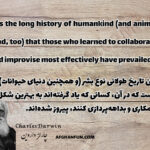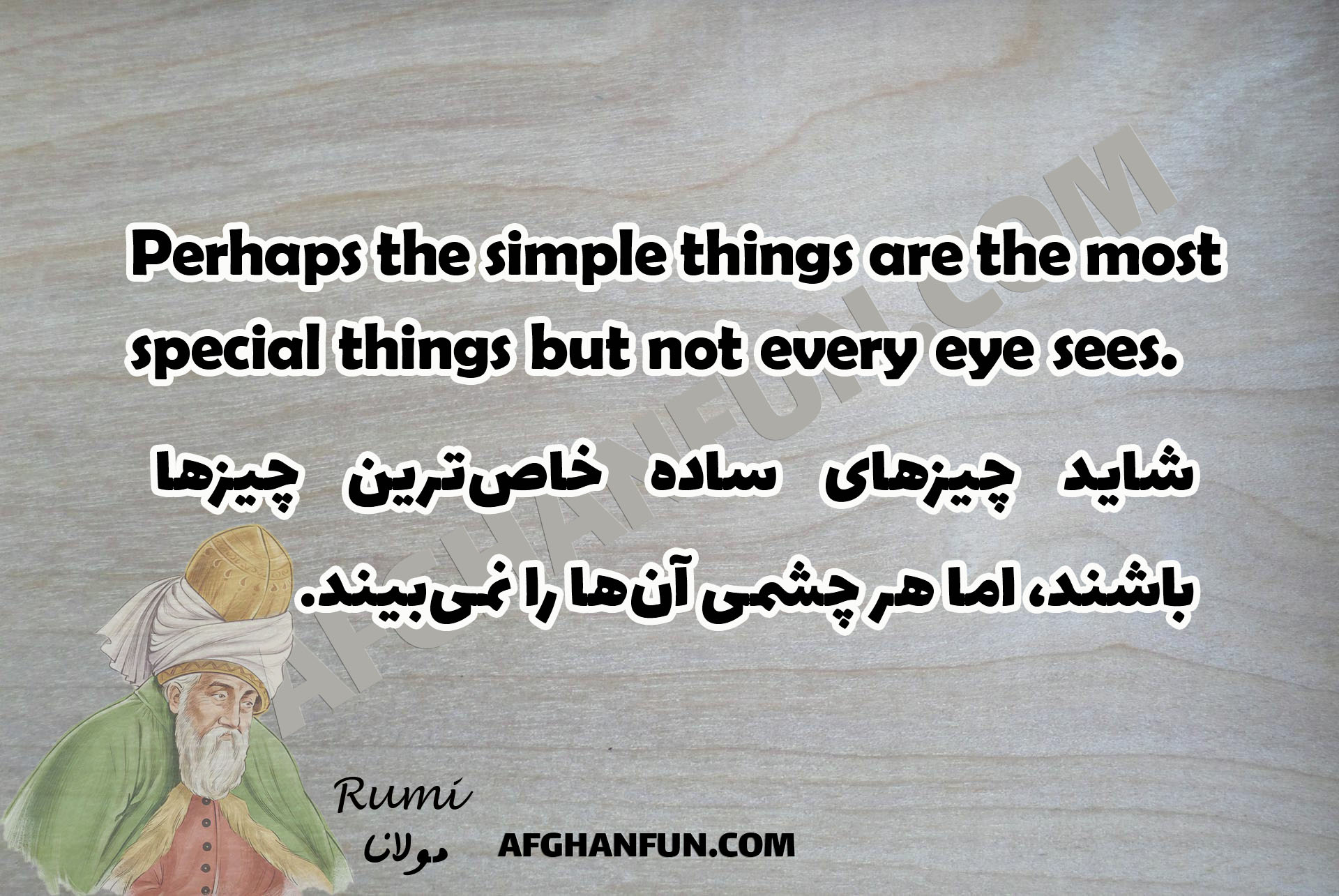Seeing Beyond the Surface: Rumi’s Wisdom
Perhaps the simple things are the most special things but not every eye sees.
Rumi
Simple Wonders: Rumi’s Hidden Truth
شاید چیزهای ساده خاصترین چیزها باشند، اما هر چشمی آنها را نمیبیند.
مولانا
مولانا در این نقل قول تأکید میکند که زیبایی و ارزش واقعی زندگی در سادگی نهفته است. با این حال، همه توانایی دیدن یا درک این حقیقت را ندارند، چرا که بسیاری از افراد درگیر پیچیدگیهای ظاهری هستند و از جوهره ساده و اصیل زندگی غافل میمانند.
Rumi’s Perspective: Seeing the Extraordinary in the Everyday
Шояд чизҳои сода махсустарин чизҳо бошанд, вале на ҳар чашм онҳоро намебинад.
МАВЛОНО ҶАЛОЛУДДИН МУҲАММАДИ БАЛХӢ
Мавлоно таъкид мекунад, ки зебоӣ ва арзиши воқеии зиндагӣ дар содагӣ нуҳуфтааст. Аммо на ҳама метавонанд ин ҳақиқатро бубинанд, чунки бисёриҳо ба чизҳои печида рӯй меоранд ва аз моҳияти содаву ҳақиқии зиндагӣ дур мемонанд.
A Matter of Perspective: Rumi’s Simple Treasures
لعل الأشياء البسيطة هي أكثر الأشياء تميزا ولكن ليست كل عين ترى.
مولانا جلال الدین محمد الرومي
يشير مولانا في هذا القول إلى أن الجمال والقيمة الحقيقية في الحياة تكمن في البساطة. ولكن ليس كل شخص يستطيع رؤية ذلك، لأن كثيرين ينشغلون بالمظاهر المعقدة ويغفلون عن جوهر الحياة البسيط والأصيل.
How to Cultivate Gratitude for Life’s Small Joys
Analysis of this Rumi quote reveals multiple layers of meaning that connect not only to his spiritual philosophy but also to broader human experiences and the way we engage with the world around us.
1. The Nature of Simplicity:
Rumi points to the idea that “the simple things are the most special things.” This evokes the notion that profound wisdom, beauty, and joy can often be found in the most unadorned aspects of existence. From a spiritual perspective, simplicity represents purity and authenticity—qualities that Rumi emphasizes in his teachings about the path to inner peace and enlightenment. Simplicity, in this context, might refer to the essence of things as they truly are, unclouded by ego, social conditioning, or external expectations.
Rumi’s work frequently touches on the idea of spiritual clarity, where individuals must strip away layers of distraction and complication to see the truth. He invites us to consider that the most meaningful experiences and the deepest truths about life are not found in grand gestures or material success, but in the subtle, humble aspects of being—such as a quiet moment of meditation, the unconditional love shared between beings, or the simple act of being present in the world. The “simple things” may be fleeting or overlooked, but they hold immense significance if only we learn to see them.
2. Perception and Awareness:
Rumi’s assertion that “not every eye sees” introduces a poignant commentary on human perception. This suggests that the ability to perceive the value of simplicity is not inherent in all individuals. What one person might view as profoundly meaningful, another may disregard. This relates to the limitations of ordinary, ego-driven perception. Our senses and intellect often filter reality through the lens of personal desires, fears, and biases, causing us to miss the deeper truths and beauty present in everyday life.
In many of Rumi’s poems, there’s an underlying theme of seeing beyond the surface—seeing with the “eye of the heart.” This kind of seeing goes beyond intellectual or sensory recognition. It involves an intuitive awareness that perceives the world in a more spiritual, holistic manner. When Rumi refers to “not every eye sees,” he may be highlighting how most people are trapped in conventional ways of seeing, focused on the outward world and material concerns. True sight, in Rumi’s view, comes from spiritual awareness and a deep connection to one’s inner essence and the divine.
3. Ego and Conditioning:
Another layer of meaning might lie in the relationship between ego and perception. In many of Rumi’s teachings, the ego is seen as a veil that obstructs true perception. The “eye” in this context could symbolize the way one’s ego influences their view of the world. The ego often distorts things, making people desire more complexity, more external validation, or more possessions. When Rumi says that “not every eye sees,” he is implicitly pointing out that those who are dominated by the ego are unlikely to recognize the true value of simplicity, because their focus is always on seeking more—more experiences, more possessions, more approval.
True vision, according to Rumi, is not obstructed by these worldly desires. It sees through them to the simplicity that lies beneath. This simplicity, in its purest form, might be understood as a state of wholeness or unity with the divine—a quality often experienced in moments of spiritual awakening.
4. The Hidden Nature of Beauty and Truth:
The quote can also be interpreted as an invitation to acknowledge the hidden, subtle nature of beauty and truth. Not everything that is valuable is immediately obvious. The “simple things” might include acts of kindness, fleeting moments of peace, or the subtle rhythms of nature—elements that may be overlooked by those who are preoccupied with busyness or complexity. Rumi often writes about the ineffable and the invisible—things that cannot be grasped by the rational mind but can only be experienced with a deeper sense of awareness.
This might be seen as a metaphor for the spiritual journey itself, where the seeker learns to perceive not through the lens of logic and reason but through a form of deep attunement to the heart and soul. The most precious things—such as love, truth, and inner peace—often exist in quiet, hidden forms. They are not always loud or dramatic; they are often found in the gentle, unassuming moments that others might pass by without a second glance.
5. Invitation to Reevaluate Priorities:
On a practical level, this quote serves as a gentle invitation to reconsider our values and how we engage with life. In a world that increasingly prioritizes complexity, success, and external validation, Rumi is asking us to pause and reconsider: What truly matters? Are we missing out on the precious moments because we are too busy chasing after things that are fleeting or less important? His words encourage mindfulness and self-reflection, reminding us that the things we take for granted or dismiss as trivial—such as a quiet moment of reflection or a shared smile—may actually be the very things that bring us the deepest fulfillment.
Conclusion:
At its core, this quote by Rumi is a profound reflection on perception, simplicity, and the often-hidden beauty of life. Rumi invites us to cultivate the ability to see with deeper awareness, to recognize that the simplest things—those moments and experiences that might be overlooked by others—hold the greatest value. He challenges us to move beyond surface-level distractions and to engage with life in a more conscious, spiritually attuned way. In doing so, we open ourselves to a more profound and meaningful connection with the world around us.











